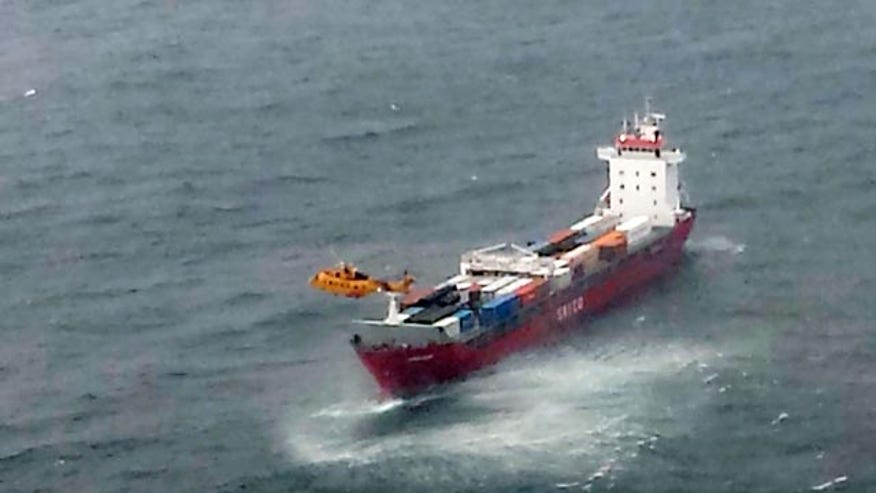 October 17, 2014: In this aerial photo provided by the Department of National Defense Maritime Forces Pacific, a Canadian Coast Guard helicopter flies near a Russian container ship carrying hundreds of tons of fuel drifting without power in rough seas off British Columbia’s northern coast. (AP Photo/The Canadian Press, Department of National Defense Maritime Forces Pacific)
October 17, 2014: In this aerial photo provided by the Department of National Defense Maritime Forces Pacific, a Canadian Coast Guard helicopter flies near a Russian container ship carrying hundreds of tons of fuel drifting without power in rough seas off British Columbia’s northern coast. (AP Photo/The Canadian Press, Department of National Defense Maritime Forces Pacific)
PRINCE RUPERT, British Columbia – A large tug boat was pulling a disabled Russian cargo ship along British Columbia’s coast, ending fears that the vessel carrying hundreds of tons of fuel would drift ashore, hit rocks and spill.
Lt. Paul Pendergast of the Canadian Forces’ Joint Rescue Co-ordination Centre said the Barbara Foss arrived Saturday evening and the tow of the Simushir was going well.
Pendergast said authorities will wait until the Simushir is comfortably north of Haida Gwaii before they make a decision on where it will be towed. Prince Rupert is the nearest container ship port, 93 nautical miles away.
The Simushir lost power late Thursday off Haida Gwaii, also known as the Queen Charlotte Islands, as it made its way from Everett in Washington state to Russia.
The Coast Guard ship Gordon Reid earlier towed the disabled ship away from shore, but a towline got detached and the ship was adrift again for six hours Saturday.
The 10 crew members were trying to repair the broken oil heater that has left the vessel disabled, Royal Canadian Navy Lt. Greg Menzies said.
The fear of oil spills is especially acute in British Columbia, where residents remember the Exxon Valdez disaster of 1989. Such worries have fed fierce opposition — particularly from environmentalists and Canada’s native tribes — to a proposal to build a pipeline that would carry oil from Canada’s Alberta oil sands to a terminal in Kitimat, British Columbia, for shipment to Asia. Opponents say the proposed pipeline would bring about 220 large oil tankers a year to the province’s coast.
The president of the Council of the Haida Nation warned Friday that a storm coming into the area was expected to push the ship onto the rocky shore, but President Pete Lantin later said their worst fears had subsided.
“If the weather picks up it could compromise that, but as of right now there is a little sense of relief that we might have averted catastrophe here,” Lantin said.
About 5,000 people live on the islands and fish for food nearby, Lantin said.
The Simushir, which is about 440 feet long, was carrying a range of hydrocarbons, mining materials and other related chemicals. That included 400 tons of bunker oil and 50 tons of diesel.
The vessel is not a tanker but rather a container ship. In comparison, the tanker Exxon Valdez, spilled 35,000 metric tons of oil.
A spokesman for Russian shipping firm SASCO, the owners of the vessel, said it is carrying 298 containers of mining equipment in addition to heavy bunker fuel as well as diesel oil for the voyage.
The U.S. Coast Guard had a helicopter on standby in the event that the crew members need to be pulled off the ship. Officials said the injured captain was evacuated by helicopter, but they were given no further medical details.
The Simushir is registered in Kholmsk, Russia, and owned by SASCO, also known as Sakhalin Shipping Company, according to the company’s website. The SASCO website says the ship was built in the Netherlands in 1998.
View the original article here
Disabled Russian container ship towed away from British Columbia coast